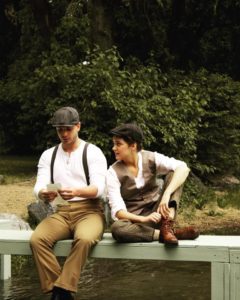Between August 2021 and June 2022, I saw and reviewed four productions of As You Like It. And just as I discovered when I saw four stagings of Romeo and Juliet within a short time, there are lessons that I learned from seeing As You Like It four times.
A Play with Problems

Given how popular it is, As You Like It is a very difficult play to stage successfully. In my review for the Westminster College production of the play (my 300th review for this site), I listed its problems. First, the script provides no reason for why Rosalind remains in disguise longer than she needs to. Second, it is difficult to build a convincing romance between Rosalind and Orlando because the two characters are together on stage for very little time before Rosalind disguises herself as a boy. Third, Orlando seems very stupid for not recognizing Rosalind in disguise, even when gazing into her eyes during the lengthy wooing scene. Finally, Shakespearean tropes and language in As You Like It, such as cross-dressing, elevated language, and quotable lines, are not as masterfully executed as in some of the Bard’s masterpieces.
As I watch the play repeatedly, the script’s flaws never diminish. Any director and actor working on this play needs to confront and solve these problems in order for the play to work. Unlike A Midsummer Night’s Dream or Macbeth, the script of As You Like It is not strong enough for the show to succeed with minimal effort. As You Like It is a challenge, and there seems to be no shortage of companies willing to take on that challenge.
The Problems are Solvable

Despite the issues in the script, As You Like It can succeed. All four productions I saw in this past year were able to solve at least some of the problems. For example, the BYU Young Company production, Rosalind seemed to stay in disguise because she wanted to be sure that Orlando really did love her before continuing the relationship. In the Creekside Theatre Festival production (still playing through July 1), Rosalind appeared to remain disguised because she enjoyed the freedom and influence that being a man gave her. There are surely other possibilities for directors to discover.
Creekside also solved the problem of Rosalind and Orlando’s relationship by slowing down in their early scenes and ensuring that both characters appeared smitten before they get separated by exile. It made a world of difference, especially compared to the productions I saw at Grassroots Shakespeare and BYU Young Company, which cut the script down and sped up the action in every scene. Orlando and Rosalind’s pre-exile scenes together are some of the most important in the play and should remain intact.
As for Orlando’s difficulty in recognizing Orlando, both Westminster and Creekside solved this problem by making Rosalind’s costume as “Ganymede” as convincingly male as possible. The more feminine Ganymede looks, the stupider Orlando appears for not recognizing that the “boy” is actually his girlfriend.
Finally, there is no avoiding the fact that As You Like It falls short of other beloved Shakespeare plays. The cross-dressing is not as effective as in Twelfth Night. The romance between the leads and tidy ending with four marriages is not as compelling as in Much Ado About Nothing. And the language falls short of the heights of of Hamlet, Macbeth, or Romeo and Juliet. What to do about this? In all four productions I saw, the answer was to trust Shakespeare and lean into the material he does give the actors. None of the productions shortened the famous “All the world’s a stage” scene, and all played up the comedy and rhythm of the language in Act V, Scene 2 where Silvius, Orlando, and Phebe are all pledging their love. (“And I for no woman!”) Though he wrote other masterpieces, Shakespeare gives actors the tools in As You Like It to still craft great performances, if they will just trust him by playing up the beauty and style of the language and fun of the comedy.
The Shift in Scene and Tone

Duke Frederick’s court is a foreboding place, where the duke tyrant and rules by fear, most notably when he threatens Oliver. The tone is very different the action moves to the Forest of Arden from Duke Frederick’s court. The Forest of Arden is a idyllic, tranquil place where the complications and problems of society melt away. It is essential that a production of As You Like It emphasize this difference for the play to work. When I saw the play this past year, I was pleased that the BYU Young Company, Westminster College and Creekside Theatre Festival all showed an obvious contrast between the two locations. These companies ensured that the visual elements of the play (i.e., costumes, set, and/or lighting) were obviously different from court to forest, which communicated important information about the setting and mood of each scene.
The difference between court and forest is unsurprising. In Shakespeare’s plays, the forest is a place where some of the rules of society do not apply and where strange things can happen. This is most obvious in A Midsummer Night’s Dream, but it also occurs in The Two Gentlemen of Verona, The Merry Wives of Windsor, and other plays. Likewise, strong shifts in tone are not unusual in Shakespeare’s plays. Richard II and A Winter’s Tale also share this characteristic.
The Other De Boys Boys

Orlando, the youngest son of the deceased Sir Rowland de Boys, is the main focus of As You Like It. But the play shows Orlando’s two older brothers: Oliver and Jaques. In three of the productions I saw (Grassroots Shakespeare Company, Westminster College, and Creekside Theatre Festival), Oliver de Boys was one of the most compelling supporting characters. Shakespeare has given the character some marvelous character growth, changing from being an angry, haughty oldest brother to being humbled and mending his relationship with Orlando. It is one of best and most realistic changes of heart in the Shakespeare canon and gives the play a lovely message about the importance of forgiveness. (This theme is treated better in As You Like It than in The Two Gentlemen of Verona or The Tempest.)
And then there is Jaques de Boys. In keeping with the trope of the neglected, unloved middle child, many people forget that he exists, and Shakespeare barely uses the character. Jacques de Boys is named in the first scene but does not appear until the final scene, where he announces Duke Frederick’s abdication. As a middle child in a family of sons, I have a soft spot for this minor, overlooked character.
One issue with Jaques de Boys is that he has the same name as Jaques, the cynical courtier of As You Like It. Creekside Theatre Festival distinguished the two by having Orlando pronounce his brother’s name as the one-syllable French “Jacques” and the courtier’s name as the traditional “JAY-quees.”
Beyond my analysis as a critic, I have learned to appreciate As You Like It while seeing it so frequently this past ten months. Last year, I felt ambivalent about the play. Before 2021, I had reviewed four other productions of As You Like It, and I failed to understand its popularity. It was a nice show, but not special. (I feel the same way about The Merry Wives of Windsor.) After seeing these four recent productions, my opinion about the play has improved, and I found myself enjoying it more with each version I saw. Maybe the most important lesson I learned from watching As You Like It four times in less than a year is the importance of giving a classic a second — or third — or fourth — chance.
